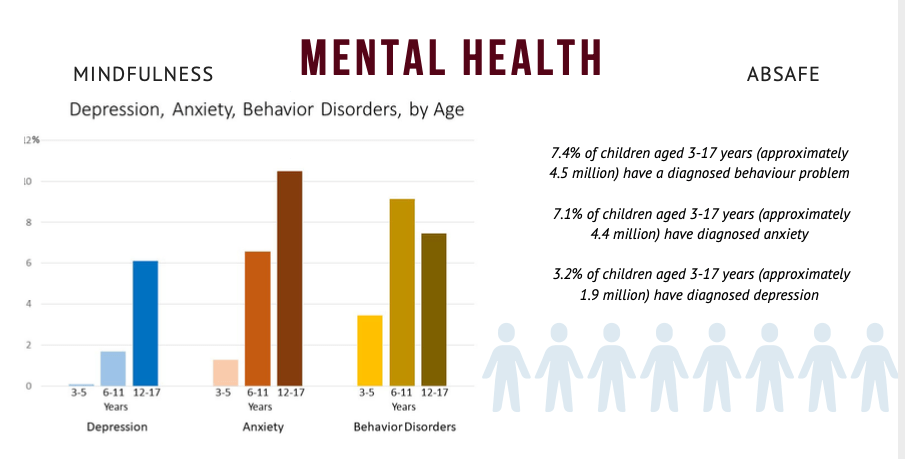Mindfulness in Schools
Mindfulness in schools / Mental Health
Absafe have expanded their Health and Safety Education to include looking after the community’s mental health. We give you the skills to look after your mental health.
Students, like everyone else, face the modern challenge of attention deficit. With each new digital distraction, it becomes increasingly difficult to focus on the right things. Students also experience the pressure of exam stress, performance competition, anxiety about their potential future opportunities, and so on. With these issues in mind, there are many benefits of mindfulness for students who decide to take up the practice.
Mindfulness is the practice of bringing your full awareness of the present rather than thinking about the past or the future. It’s about living in the moment without judgment. Some people practice mindfulness for a few minutes a day, while others practice it as a lifestyle. For example, you could practice mindful eating; paying attention to what is on your plate, feeling gratitude for it, savouring each bite, while also noticing how your body reacts to the food on your plate.
The practice of mindfulness takes some weight off your awareness while helping you to focus on what is important. As a student, there are numerous advantages to be had when practicing mindfulness regularly. Here are some of the benefits you may come to experience.
Absafe can offer Mindfulness sessions to your students of all ages.
Mindfulness for Students – What are the Benefits?
1. Reduces stress and anxiety
Throughout its history, mindfulness has shown itself as a proven method for managing stress and anxiety. Both of these conditions are developed through internal and external pressure. Internal pressure includes self- criticism, self-doubt, worries about your capabilities, and so on. It could also be a symptom of another development, e.g a student with a health condition may feel anxiety about their future wellbeing.
External pressure could be parental influence, workload or pressure from peers. By practicing mindfulness, you permit yourself to acknowledge pressure without dwelling on it. Instead of feeling stressed and anxious about the past or future, you can focus on the life you want to live for each day. This extends to your education. By assessing 125 students during exam time, researchers discovered that mindfulness exercises were effective in reducing stress and anxiety.
2. Improves attention and focus
In many ways, paying attention is an allocation of resources. There’s only so much that we can actively focus on at once. Recent research by psychologists shows that meditation, a mindfulness practice, is effective in improving the allocation of the resource known as attention.
Even complete novices, in the art of meditation, were able to see improvement with 10-minute sessions. If you struggle with keeping your focus on lectures, assignments, or study materials for a significant amount of time, taking up mindfulness practices can be helpful for improvement.
3. Improves the student’s cognitive performance
Mindfulness has shown to improve cognitive performance when responding to time-sensitive tasks. One study showed that students who are allowed meditation periods during tests show better scores. These results could be achieved because mindfulness improves learning effectiveness, attention, and memory in students. In another study, Taiwanese students were taken through a one-semester mindfulness meditation course. The students showed significant improvement in overall performance suggesting some benefits to this practice for students.
Testimonials:
“It made me feel calm and safe”
“After it I felt really warm and happy”
“I was able to concentrate better”
“I liked it, it took away my troubles”
7.4% of children aged 3-17 years (approximately
4.5 million) have a diagnosed behaviour problem
7.1% of children aged 3-17 years (approximately 4.4 million) have diagnosed anxiety
3.2% of children aged 3-17 years (approximately 1.9 million) have diagnosed depression
To learn more about Absafe please visit their website or contact Louise Richardson directly
4. Better emotional and social intelligence
Young students learn most of what they know about social interactions and emotional management in the school environment. Some students learn to display more empathy and emotional understanding earlier than others. Some others become more susceptible to negative peer pressure or emotional manipulation.
Mindfulness is one of the proven methods which can be used to improve emotional intelligence (EI) in young students. A good level of the EI trait has been linked to individual competence for mindfulness. By learning basic mindfulness practices, students can improve awareness of their emotions and of the people around them. It will also help them handle challenges better and improve their empathy towards others.
5. Improves memory
Mindfulness is scientifically proven as beneficial for the memory. Let’s start by looking at the most obvious reason why mindfulness improves memory. When you actively listen during lessons, pay better attention to the present, train your awareness to stay focused on the ‘now’, and other mindful practices, you take in better-structured information. It becomes easier to remember what your professor said in the last class because you were actively listening. Your study notes wouldn’t seem like a stranger’s scribble anymore because you mindfully penned down each word.
A recent study showed that people who mindfully pay attention to relevant information2 (e.g. your professor teaching in class), retain new, related information better (e.g. a textbook chapter on the same topic. By simply listening or reading mindfully, you can improve your academic performance without adding more hours to your current study plan.
6. Helps students who struggle with perfectionism
Mindfulness and perfectionism cannot co-exist in the same moment of awareness. The practice of mindfulness means regarding everything around you, including yourself, without judgment. By practicing mindfulness, students who focus obsessively on perfect grades can come to see the benefits of taking risks and making mistakes. They may also effectively reduce the emotional pressure on themselves to be correct at all times. The learning process should be experienced and enjoyed, and more students can benefit from this realization.

What to do if Your School Suffer a Data Breach
Data Breach: What to do if your school suffers a data breach: Our growing reliance on technology has been compounded and increased by the coronavirus pandemic . From working remotely, to communicating with family, to test and trace apps, to online shopping, our...
What Schools Must do to Tackle Ransomware Crisis
What schools must do to tackle ransomware crisis! Cyber criminals are increasingly using ransomware to attack the education sector. The trend is most noticeable in the US, with criminals locking up school’s systems and demanding a payment to release the data, but...
Support for UK Education Sector After Growth in Cyber Attacks
The NCSC has updated an alert following the increase in ransomware attacks against the education sector National Cyber Security Centre (NCSC) provides additional support for education establishments following rise in ransomware attacks since late February Spike in...




